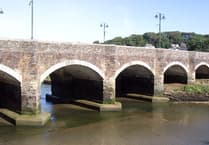Cornwall Council’s cabinet member for environment says a ground-breaking new report detailing how the region will be impacted by climate change underlines the need to act now to reduce emissions and tackle climate risks.
Cornwall Council is the first in the country to publish a “Climate Change Risk Assessment” which examines regional effects of rising sea levels and more extreme weather in Cornwall.
The report is produced by Cornwall-based climate science consultancy Climate Change Risk Management, (CCRM), led by director Professor Stephan Harrison, professor of climate and environmental change at the University of Exeter.
CCRM is made up of scientists working at the forefront of climate change science and policy with authors contributing to reports for the United Nations’ Intergovernmental Panel on Climate Change.
The Cornwall Climate Change Risk Assessment report says the region will see among the highest potential sea level rises around the UK by the end of the century, in the range of 0.2m to 1m.
The report notes that due to climate change, there is a possibility of more high impact flooding of the type seen in Boscastle in 2004 and Coverack in 2017. The area will see stronger storms and higher wind speeds, faster coastal erosion and more heatwaves and severe droughts.
Councillor Martyn Alvey, Cornwall’s portfolio holder for environment and climate change, said: “Our Climate Change Risk Assessment Report is a first for a local authority and informs all of us, from our policy makers to residents to businesses, of the risks from climate change in Cornwall so we can make evidence-based decisions.
“It strongly underlines the need for us to act – to be aware of our impacts on the climate and to understand the risks that are coming. It highlights the fact there is no time to lose when it comes to cutting our emissions to reduce the likelihood of these risks to our communities and environment.
“Climate change is affecting us now, with the frequency of more extreme weather events growing. Building on our strong track record of supporting communities to be resilient, this report will help us consider how we will need to adapt and how we can support communities in developing their adaptation plans.
“As a council we are ahead of our targets on becoming a carbon neutral council by 2030. Across Cornwall emissions levels have also reduced in recent years but we all need to do more. If you’re unsure what you can do to help Cornwall become carbon neutral talk to us now. You can also visit our interactive Climate Change Centre at Heartlands or visit our Carbon Neutral Cornwall Hive online to learn about the small changes you can make that could have a big impact on your emissions and save money.”





Comments
This article has no comments yet. Be the first to leave a comment.